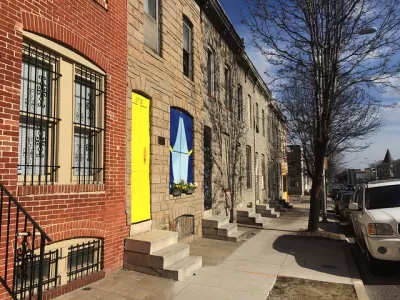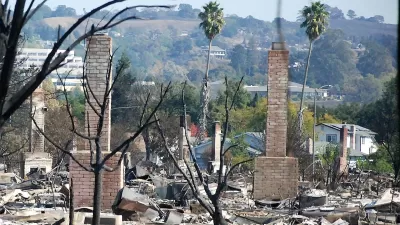A report from the Urban Land Institute calls for a multi-faceted approach to stabilizing the housing market and protecting tenants and homeowners.

A survey of tenants, advocates, and real estate professionals conducted by the Urban Land Institute (ULI) shows that most Americans support extending and institutionalizing assistance programs that helped people stay in their homes during the pandemic, writes Jason Plautz in Smart Cities Dive. One analysis shows that the federal eviction moratorium, struck down by the Supreme Court in August, led to 1.55 million fewer evictions than normal. A report released last week calls for a robust, multi-angle approach to stabilizing the "unsustainable" rental market and preventing further evictions and foreclosures.
According to Plautz, "all parties generally agreed that cities and states should implement or enhance programs that provide emergency assistance and long-term support to renters, increase housing supply and ensure safe and clean housing." Fewer respondents supported policies like rent control and zoning reform, which have stirred heated debates among local stakeholders as cities and states move to eliminate single-family zoning, encourage housing construction and density, and promote transit-oriented development. "One area that did see more consensus was the need to increase housing supply, both for renters and for first-time homebuyers," writes Plautz.
The report also suggests more innovative solutions such as community land trusts and housing cooperatives that can lower cost and put homeownership within reach of more households, particularly in communities of color that face added hurdles to finding affordable housing.
FULL STORY: To correct 'unsustainable' rental market, 'all of the above' policy needed: report

Alabama: Trump Terminates Settlements for Black Communities Harmed By Raw Sewage
Trump deemed the landmark civil rights agreement “illegal DEI and environmental justice policy.”

Planetizen Federal Action Tracker
A weekly monitor of how Trump’s orders and actions are impacting planners and planning in America.

The 120 Year Old Tiny Home Villages That Sheltered San Francisco’s Earthquake Refugees
More than a century ago, San Francisco mobilized to house thousands of residents displaced by the 1906 earthquake. Could their strategy offer a model for the present?

In Both Crashes and Crime, Public Transportation is Far Safer than Driving
Contrary to popular assumptions, public transportation has far lower crash and crime rates than automobile travel. For safer communities, improve and encourage transit travel.

Report: Zoning Reforms Should Complement Nashville’s Ambitious Transit Plan
Without reform, restrictive zoning codes will limit the impact of the city’s planned transit expansion and could exclude some of the residents who depend on transit the most.

Judge Orders Release of Frozen IRA, IIJA Funding
The decision is a victory for environmental groups who charged that freezing funds for critical infrastructure and disaster response programs caused “real and irreparable harm” to communities.
Urban Design for Planners 1: Software Tools
This six-course series explores essential urban design concepts using open source software and equips planners with the tools they need to participate fully in the urban design process.
Planning for Universal Design
Learn the tools for implementing Universal Design in planning regulations.
Clanton & Associates, Inc.
Jessamine County Fiscal Court
Institute for Housing and Urban Development Studies (IHS)
City of Grandview
Harvard GSD Executive Education
Toledo-Lucas County Plan Commissions
Salt Lake City
NYU Wagner Graduate School of Public Service





























